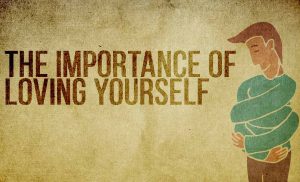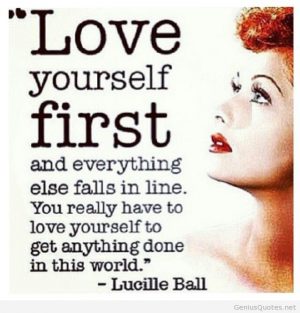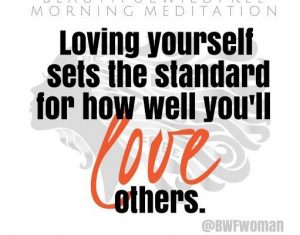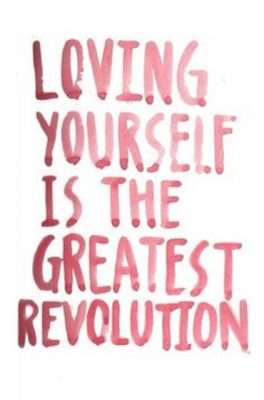 How to have self-love? And why? ((here is another article I wrote about this topic: self love))
How to have self-love? And why? ((here is another article I wrote about this topic: self love))
I have been struggling with this forever. Somewhere in the deep recesses of my mind there is a huge resistance to it…
I listen in… I don’t even have to put a pillow on my head… I can now hear it, just need to listen.
–You are not perfect… yet
–If you ever loved yourself you would stop striving
–If you loved yourself then you would be selfish
There may be more… these are memes. Mind viruses.
All untruth perpetuated to keep people unhappy, not loving themselves. Not being on their own side.
Unhappy people are good sheep… buy stuff, get sick, love things that make other people rich.
Everyone, parents, spouses, the culture argue against loving yourself.
Interestingly, not against admiring yourself, against narcissistic behavior.
Narcissism is not self-love. Narcissistic people live on the energy of other people… what others call self-love is really narcissistic self-adoration (adoring), entitlement, using other people, placing oneself above others. It is a comparison game… desire for the self alone.
 Self-love is acceptance, compassion, encouragement, soothing, allowing. Nothing about other people.
Self-love is acceptance, compassion, encouragement, soothing, allowing. Nothing about other people.
The opposite of self-love is self-hate, and I dare to say, that narcissistic people actually hate themselves. And their hate spills out to everyone around them.
Self-love, on the other hand, can spill out on other people… love them, cherish them, value them.
The level of self-love is less than 1% in all of humanity.
James Altucher’s life was transformed when he began to choose himself. He went from self-hate to 7% self-love. It’s not full self-love… but he is on the right path.
I have read his book “Choose Yourself”. My level of self-love is 10% and yet I have been struggling to see what it would mean, what it COULD mean to me to choose myself…
I have, so far, seen that I can now say occasionally: I am important to me. I can now say: I can do for myself and be willing to fight another day. I can see that I can rest, that I can take time out, that I can take care of myself…
It still makes me very-very scared, the idea. The idea that is so incredibly “swimming upstream” that I am afraid of punishment. From people.
When I was little, I was regularly punished for following my inner guidance.
I was a special needs person in many different ways. Dyslexic, unable to read people… I felt their emotions, but that is NOT reading them or their intentions. I was (am) plagued with intolerances: my body needs to be fed and treated like a very sensitive instrument… any deviation throws it off and it stops working well.
But no one cares, you need to toe the line, fit in, eat what everyone eats, eat when everyone eats, even if it kills you.
 So I was trained relentlessly, I might say, to not care about myself, to not love myself, to place everyone’s needs before my own.
So I was trained relentlessly, I might say, to not care about myself, to not love myself, to place everyone’s needs before my own.
And I was never well. Never.
I have clients like this… in fact, I think, I am nothing special in this regard.
If you consider that having been born in a family doesn’t make you the same, maybe not even similar. Your DNA will share some characteristics, but not all, maybe not even many.
Physically I took after my father… but when was the last time a man had any say in what they eat, how they eat? In my experience: never.
There are many tests to find out to what degree you are narcissistic.
Why do you want to know? Because being a narcissist is horrible. Inside. You are a user, you are a puppet on a string.
 Having to, needing to, wanting to, and should is running your life: no peace.
Having to, needing to, wanting to, and should is running your life: no peace.
I have some clients who are 30% narcissistic. I am working with them to remove the compulsion…
And I have some “want to”, and ex-clients who are 50% narcissistic.
One of the aspects I see is that when you have to be in a certain way (compulsion) you are not free to get better, to learn anything, because growing, learning, have a long phase where you are just simply lousy. Bad. And someone with a compulsive narcissistic personality is not going to submit themselves to that.
So most narcissistic people are underachievers. I am not talking about worldly achievements, I am talking about knowledge, skill, that they could have but won’t.
Trump, the president is like that. 50% narcissistic. A bully and a self-hater.
I am 7% narcissistic: comparing myself with others, instead of becoming all I can become. Down from 20% where I used to be.
If you find yourself not being able to change, not being able to love yourself, not being able to grow, suspect that you are more narcissistic than is healthy.
And start watching the puppet on a string compulsion: the having to, needing to, wanting to/not wanting to, and the should.
That may be your access to seeing yourself accurately, and to start growing yourself.
If you don’t understand self-love, you may misunderstand it… or maybe you have no access to it.
Either way: self-love is needed to grow… even though the memes may say: you are selfish.
Lastly: if you live inside the right/wrong paradigm, where something is either right or wrong, where things need to be fixed, then you have no access to the level where you can love yourself.
 You can only love yourself on the intrinsic level where nothing is ever wrong.
You can only love yourself on the intrinsic level where nothing is ever wrong.
My Avatar State activator (it activates the vertical dimension energetically, the Self) can be very instrumental.
The Avatar State activator is a vortex energy. It is so strong that if you listen to it too closely, it scrambles your brain… you don’t want that.
You want to play it in the background. If you don’t hear it, it probably isn’t doing anything for you.
PS: read the NY Times article for contrast. My article has 60% truth value, the NY Times article has 4% value. Like that article? below… it should tell you something about yourself.
Why You Should Stop Being So Hard on Yourself
Self-criticism can take a toll on our minds and bodies. It’s time to ease up.
By Charlotte Lieberman
May 22, 2018
“We’re all our own worst critics.” Ever heard that one before?
Yes, it’s an obnoxious cliché, but it’s not just self-help fluff. Evolutionary psychologists have studied our natural “negativity bias,” which is that instinct in us all that makes negative experiences seem more significant than they really are.
In other words: We’ve evolved to give more weight to our flaws, mistakes and shortcomings than our successes.
“Self-criticism can take a toll on our minds and bodies,” said Dr. Richard Davidson, founder and director of the Center for Healthy Minds at the University of Wisconsin-Madison, where he also teaches psychology and psychiatry.
“It can lead to ruminative thoughts that interfere with our productivity, and it can impact our bodies by stimulating inflammatory mechanisms that lead to chronic illness and accelerate aging,” he said.
Advertisement
But that’s not the end of the story. There are ways around our negativity bias, and it is possible to turn self-criticism into opportunities for learning and personal growth. (Really!) But first, let’s talk about how we got here.
O.K., so, why are we so hard on ourselves?
For one, blame evolution.
“Our brains equip us with a mechanism to monitor our mind and our behavior,” Dr. Davidson said, so that when we make errors, we are able to notice the mistake. “In order to recover, we first must notice that a mistake has occurred,” he said.
You have 2 free articles remaining.
Subscribe to The TimesJust noticing that we’ve deviated from our expectations or goals — whether that’s eating too much or not completing a daily to-do list — isn’t necessarily the same thing as degrading ourselves into a shame spiral. In some cases, like when our safety or moral integrity are on the line, it’s crucial that our brains tell us good from bad so that we learn the right lessons from our experiences.
But sometimes, assigning negative value to our experiences and behaviors can “ensnare” us, Dr. Davidson said, into cycles of unhelpful rumination — like when you lie in bed at night needlessly replaying an awkward interaction or repeatedly revisiting that minor typo. This is where we get into the harmful, counterproductive side of self-criticism.
And it’s that type of self-criticism that can have measurably destructive effects, including symptoms of depression, anxiety, substance abuse, negative self-image and, in a particularly vicious twist, decreased motivation and productivity, according to a study published in the Journal of Psychotherapy Integration. Another study, published in Personality and Social Psychology Bulletin, found that self-criticism leads people to becoming preoccupied with failure.
EDITORS’ PICKS
How the Mueller Investigation Could Play Out for Trump
We Sat Down With the ‘Arrested Development’ Cast. It Got Raw.
Storms, Missteps and an Ailing Grid Left Puerto Rico in the DarkBasically, beating yourself up for finishing only three of the five items on your to-do list is going to make you less likely to finish those last two items — and yet we’re programmed to fall into that pattern.
That seems … conflicting. What should I do?
If this feels a bit like a Catch-22, that’s because it is: We’re evolutionarily predisposed to nitpick at our failings, yet doing so has the opposite of the intended effect.
The solution? It’s called self-compassion: the practice of being kind and understanding to ourselves when confronted with a personal flaw or failure, according to Dr. Kristin Neff, associate professor of psychology at the University of Texas at Austin.
“Research shows that the No. 1 barrier to self-compassion is fear of being complacent and losing your edge,” Dr. Neff said. “And all the research shows that’s not true. It’s just the opposite,” meaning that self-compassion can lead to greater achievement than self-criticism ever could.
In fact, several studies have shown that self-compassion supports motivation and positive change. In a 2016 study researchers found that “self-compassion led to greater personal improvement, in part, through heightened acceptance,” and that focusing on self-compassion “spurs positive adjustment in the face of regrets.”
This is, of course, easier said than done. But core to self-compassion is to avoid getting caught up in our mistakes and obsessing about them until we degrade ourselves, and rather strive to let go of them so we can move onto the next productive action from a place of acceptance and clarity, according to experts.
“When we get caught up in self-referential thinking — the type that happens with rumination, worry, guilt or self-judgment — it activates self-referential brain networks,” said the psychiatrist and neuroscientist Dr. Judson Brewer, director of research at the Center for Mindfulness and associate professor in medicine and psychiatry at University of Massachusetts Medical School.
Advertisement
“When we let go of that mental chatter and go easy on ourselves, these same brain regions quiet down,” he said.
Developing an approach of self-compassion and a willingness to let go starts with practice. So where and how to start?
3 steps to self-compassion
First: Make the choice that you’ll at least try a new approach to thinking about yourself. Commit to treating yourself more kindly — call it letting go of self-judgment, going easier on yourself, practicing self-compassion or whatever resonates most.
To strengthen the muscle, Dr. Brewer suggests “any type of practice that helps us stay in the moment and notice what it feels like to get caught up. See how painful that is compared to being kind to ourselves.”
One of the most portable and evidence-based practices for noticing our thoughts and learning to let them go is meditation. Try mindfulness meditation, which involves anchoring your attention on the breath as a tool to stay present without getting lost in judgments, stories and assumptions.
(Read more: How to Meditate)
You can also interrupt the spiral of negative self-talk by focusing your energy on something external that you care about, which can help you establish perspective and a sense of meaning beyond yourself.
“If you can do things to get yourself out of your own head, like going out and volunteering or doing something nice for a family member, these things can help lift the negative voices that are going on in your head,” said Emily Esfahani Smith, author of “The Power of Meaning: Crafting a Life That Matters.”
The second step to self-compassion is to meet your criticism with kindness. If your inner critic says, “You’re lazy and worthless,” respond with a reminder: “You’re doing your best” or “We all make mistakes.”
But it’s step three, according to Dr. Brewer, that is most important if you want to make the shift sustainable in the long term: Make a deliberate, conscious effort to recognize the difference between how you feel when caught up in self-criticism, and how you feel when you can let go of it.
“That’s where you start to hack the reward-based learning system,” Dr. Brewer said.
A part of our brains called the orbitofrontal cortex is, according to Dr. Brewer, always looking for the “BBO — the bigger better offer.”
“It compares X vs. Y,” he said, “and if Y is more pleasurable or less painful, it will learn to go with Y.”
Think about it this way: How much better might it feel to take a breath after making a mistake, rather than berating ourselves?
“All you have to do is think of going to a friend,” Dr. Neff said. “If you said, ‘I’m feeling fat and lazy and I’m not succeeding at my job,’ and your friend said, ‘Yeah, you’re a loser. Just give up now. You’re disgusting,’ how motivating would that be?”
This is the linchpin of being kinder to ourselves: Practice what it feels like to treat yourself as you might treat a friend. In order to trade in self-abuse for self-compassion, it has to be a regular habit.
So the next time you’re on the verge of falling into a shame spiral, think of how you’d pull your friend back from falling in, and turn that effort inward. If it feels funny the first time, give it second, third and fourth tries.
And if you forget on the fifth, remember: Four tries is a lot better than zero.
Read the original article: How to have self-love? And why? and how narcissists hate themselves?